Sascha Diefenbacher
Agents of Discovery
Sep 10, 2025Abstract:The substantial data volumes encountered in modern particle physics and other domains of fundamental physics research allow (and require) the use of increasingly complex data analysis tools and workflows. While the use of machine learning (ML) tools for data analysis has recently proliferated, these tools are typically special-purpose algorithms that rely, for example, on encoded physics knowledge to reach optimal performance. In this work, we investigate a new and orthogonal direction: Using recent progress in large language models (LLMs) to create a team of agents -- instances of LLMs with specific subtasks -- that jointly solve data analysis-based research problems in a way similar to how a human researcher might: by creating code to operate standard tools and libraries (including ML systems) and by building on results of previous iterations. If successful, such agent-based systems could be deployed to automate routine analysis components to counteract the increasing complexity of modern tool chains. To investigate the capabilities of current-generation commercial LLMs, we consider the task of anomaly detection via the publicly available and highly-studied LHC Olympics dataset. Several current models by OpenAI (GPT-4o, o4-mini, GPT-4.1, and GPT-5) are investigated and their stability tested. Overall, we observe the capacity of the agent-based system to solve this data analysis problem. The best agent-created solutions mirror the performance of human state-of-the-art results.
Forecasting Generative Amplification
Sep 09, 2025Abstract:Generative networks are perfect tools to enhance the speed and precision of LHC simulations. It is important to understand their statistical precision, especially when generating events beyond the size of the training dataset. We present two complementary methods to estimate the amplification factor without large holdout datasets. Averaging amplification uses Bayesian networks or ensembling to estimate amplification from the precision of integrals over given phase-space volumes. Differential amplification uses hypothesis testing to quantify amplification without any resolution loss. Applied to state-of-the-art event generators, both methods indicate that amplification is possible in specific regions of phase space, but not yet across the entire distribution.
Discriminative versus Generative Approaches to Simulation-based Inference
Mar 11, 2025Abstract:Most of the fundamental, emergent, and phenomenological parameters of particle and nuclear physics are determined through parametric template fits. Simulations are used to populate histograms which are then matched to data. This approach is inherently lossy, since histograms are binned and low-dimensional. Deep learning has enabled unbinned and high-dimensional parameter estimation through neural likelihiood(-ratio) estimation. We compare two approaches for neural simulation-based inference (NSBI): one based on discriminative learning (classification) and one based on generative modeling. These two approaches are directly evaluated on the same datasets, with a similar level of hyperparameter optimization in both cases. In addition to a Gaussian dataset, we study NSBI using a Higgs boson dataset from the FAIR Universe Challenge. We find that both the direct likelihood and likelihood ratio estimation are able to effectively extract parameters with reasonable uncertainties. For the numerical examples and within the set of hyperparameters studied, we found that the likelihood ratio method is more accurate and/or precise. Both methods have a significant spread from the network training and would require ensembling or other mitigation strategies in practice.
Generative Unfolding with Distribution Mapping
Nov 04, 2024



Abstract:Machine learning enables unbinned, highly-differential cross section measurements. A recent idea uses generative models to morph a starting simulation into the unfolded data. We show how to extend two morphing techniques, Schr\"odinger Bridges and Direct Diffusion, in order to ensure that the models learn the correct conditional probabilities. This brings distribution mapping to a similar level of accuracy as the state-of-the-art conditional generative unfolding methods. Numerical results are presented with a standard benchmark dataset of single jet substructure as well as for a new dataset describing a 22-dimensional phase space of Z + 2-jets.
CaloChallenge 2022: A Community Challenge for Fast Calorimeter Simulation
Oct 28, 2024
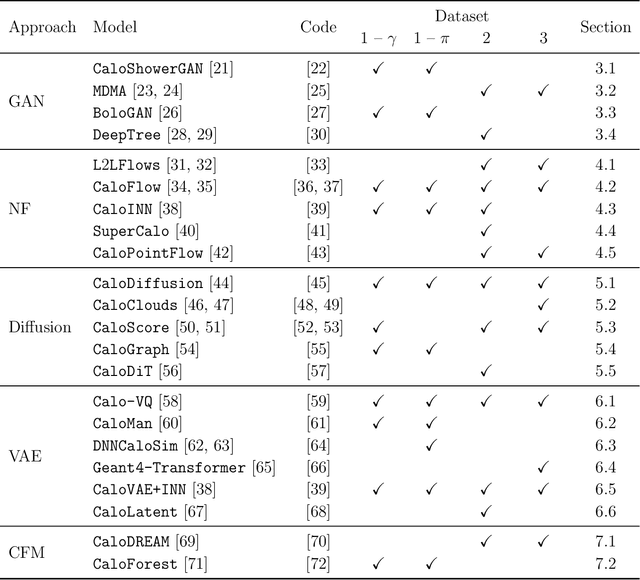
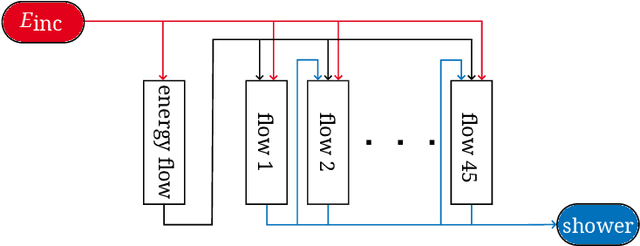
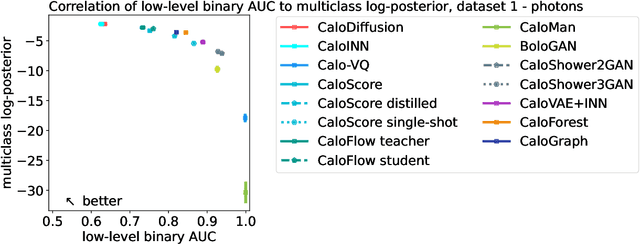
Abstract:We present the results of the "Fast Calorimeter Simulation Challenge 2022" - the CaloChallenge. We study state-of-the-art generative models on four calorimeter shower datasets of increasing dimensionality, ranging from a few hundred voxels to a few tens of thousand voxels. The 31 individual submissions span a wide range of current popular generative architectures, including Variational AutoEncoders (VAEs), Generative Adversarial Networks (GANs), Normalizing Flows, Diffusion models, and models based on Conditional Flow Matching. We compare all submissions in terms of quality of generated calorimeter showers, as well as shower generation time and model size. To assess the quality we use a broad range of different metrics including differences in 1-dimensional histograms of observables, KPD/FPD scores, AUCs of binary classifiers, and the log-posterior of a multiclass classifier. The results of the CaloChallenge provide the most complete and comprehensive survey of cutting-edge approaches to calorimeter fast simulation to date. In addition, our work provides a uniquely detailed perspective on the important problem of how to evaluate generative models. As such, the results presented here should be applicable for other domains that use generative AI and require fast and faithful generation of samples in a large phase space.
FAIR Universe HiggsML Uncertainty Challenge Competition
Oct 03, 2024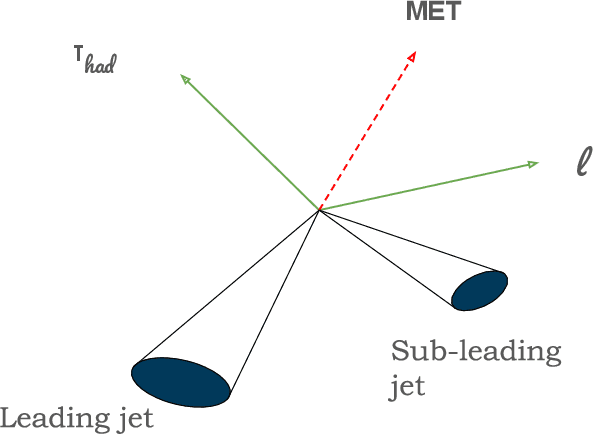
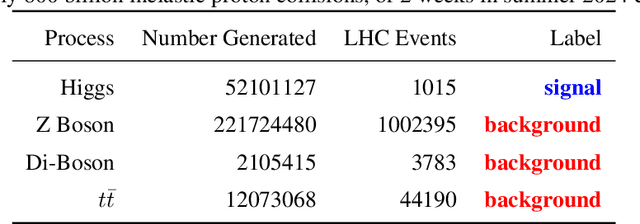
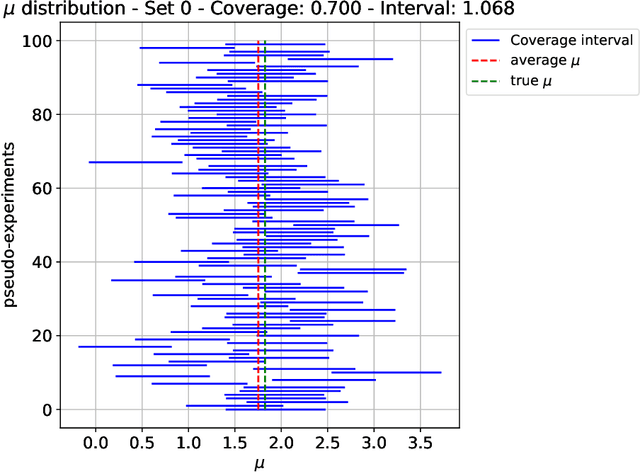
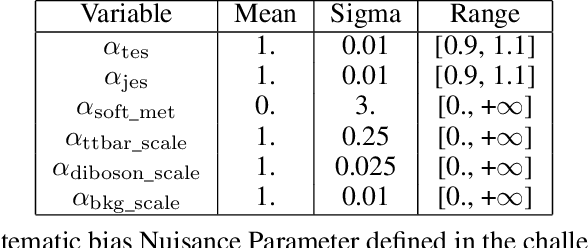
Abstract:The FAIR Universe -- HiggsML Uncertainty Challenge focuses on measuring the physics properties of elementary particles with imperfect simulators due to differences in modelling systematic errors. Additionally, the challenge is leveraging a large-compute-scale AI platform for sharing datasets, training models, and hosting machine learning competitions. Our challenge brings together the physics and machine learning communities to advance our understanding and methodologies in handling systematic (epistemic) uncertainties within AI techniques.
Calibrating Bayesian Generative Machine Learning for Bayesiamplification
Aug 01, 2024Abstract:Recently, combinations of generative and Bayesian machine learning have been introduced in particle physics for both fast detector simulation and inference tasks. These neural networks aim to quantify the uncertainty on the generated distribution originating from limited training statistics. The interpretation of a distribution-wide uncertainty however remains ill-defined. We show a clear scheme for quantifying the calibration of Bayesian generative machine learning models. For a Continuous Normalizing Flow applied to a low-dimensional toy example, we evaluate the calibration of Bayesian uncertainties from either a mean-field Gaussian weight posterior, or Monte Carlo sampling network weights, to gauge their behaviour on unsteady distribution edges. Well calibrated uncertainties can then be used to roughly estimate the number of uncorrelated truth samples that are equivalent to the generated sample and clearly indicate data amplification for smooth features of the distribution.
The Landscape of Unfolding with Machine Learning
Apr 29, 2024



Abstract:Recent innovations from machine learning allow for data unfolding, without binning and including correlations across many dimensions. We describe a set of known, upgraded, and new methods for ML-based unfolding. The performance of these approaches are evaluated on the same two datasets. We find that all techniques are capable of accurately reproducing the particle-level spectra across complex observables. Given that these approaches are conceptually diverse, they offer an exciting toolkit for a new class of measurements that can probe the Standard Model with an unprecedented level of detail and may enable sensitivity to new phenomena.
Improving Generative Model-based Unfolding with Schrödinger Bridges
Aug 23, 2023Abstract:Machine learning-based unfolding has enabled unbinned and high-dimensional differential cross section measurements. Two main approaches have emerged in this research area: one based on discriminative models and one based on generative models. The main advantage of discriminative models is that they learn a small correction to a starting simulation while generative models scale better to regions of phase space with little data. We propose to use Schroedinger Bridges and diffusion models to create SBUnfold, an unfolding approach that combines the strengths of both discriminative and generative models. The key feature of SBUnfold is that its generative model maps one set of events into another without having to go through a known probability density as is the case for normalizing flows and standard diffusion models. We show that SBUnfold achieves excellent performance compared to state of the art methods on a synthetic Z+jets dataset.
CaloClouds: Fast Geometry-Independent Highly-Granular Calorimeter Simulation
May 08, 2023Abstract:Simulating showers of particles in highly-granular detectors is a key frontier in the application of machine learning to particle physics. Achieving high accuracy and speed with generative machine learning models would enable them to augment traditional simulations and alleviate a major computing constraint. This work achieves a major breakthrough in this task by, for the first time, directly generating a point cloud of a few thousand space points with energy depositions in the detector in 3D space without relying on a fixed-grid structure. This is made possible by two key innovations: i) using recent improvements in generative modeling we apply a diffusion model to generate ii) an initial even higher-resolution point cloud of up to 40,000 so-called Geant4 steps which is subsequently down-sampled to the desired number of up to 6,000 space points. We showcase the performance of this approach using the specific example of simulating photon showers in the planned electromagnetic calorimeter of the International Large Detector (ILD) and achieve overall good modeling of physically relevant distributions.
 Add to Chrome
Add to Chrome Add to Firefox
Add to Firefox Add to Edge
Add to Edge